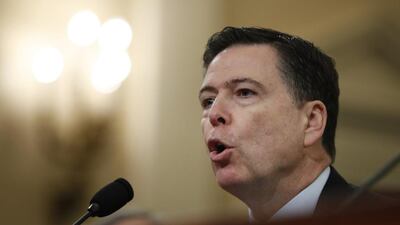Sitting before a House of Representatives intelligence committee in Washington on Monday, James Comey was asked what happened during the Watergate scandal. It was an extraordinary question to ask of the director of the Federal Bureau of Investigation, but one that reflected the upside-down nature of political leaks in American politics.
In 1972, Richard Nixon was implicated in a wiretapping scandal involving the Democratic National Committee’s headquarters located in the Watergate office building in Washington. It later emerged that Nixon tried to cover-up his involvement in the wiretapping and use federal officials to deflect the investigation against him. Facing impeachment in the House of Representatives, he resigned.
Watergate is synonymous with modern leakers because of the role the media played in exposing the abuse of power. Reporters from newspapers such as The Washington Post and The New York Times received anonymous tip-offs about the break-in at the Watergate complex. The leakers faced possible criminal punishment but, in leaking the information to the press, they exposed wrongdoing in the highest echelons of power in the United States.
After the Watergate scandal, America’s intelligence-gathering laws changed forever. The US created the Foreign Intelligence Surveillance Court (FISA) that would serve as a tribunal to ensure that the FBI or any other intelligence agency could not spy on US citizens without warrants. The closed-door court was designed to ensure that the rights of citizens were protected.
When National Security Agency contractor Edward Snowden leaked thousands of pages of classified information to journalists about NSA surveillance programmes, the issue of leakers returned to the forefront of US debate. According to Mr Snowden’s revelations, the FISA court system had been knowingly abused by high-ranking officials. While the US constitution facilitates certain protections to journalists who publish leaked information, Mr Snowden’s revelations renewed an open-ended debate about how to handle these journalists.
This debate remains unresolved as the hearing with FBI director Comey confirmed this week. Republican congressmen on the committee grilled Mr Comey about his knowledge of the existing punishment for leakers (up to 10 years in prison and hefty fines). Congressmen such as Trey Gowdy of South Carolina addressed this issue because of the rash of leaks coming out of the Donald Trump White House.
Armed with technology to encrypt communications, Washington has entered a new age of leaks. Disgruntled officials have never had an easier means of sending anonymous information to the media. And of course, leaks have been a time-honoured way of disseminating information or testing possible policy, a means employed by Democratic as well as Republican administrations. All in all, these are interesting times, indeed.

